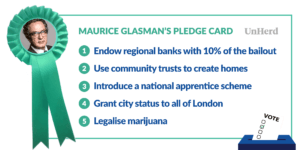Credit: Christopher Furlong / Getty
As our exit from Europe continues to dominate daily politics, other, vitally important areas are being neglected. So what should our politicians’ priorities be once we are beyond Brexit? We asked various contributors to draw up a pledge card for a post-Brexit manifesto.

1. Use 10% of the bailout to endow regional banks
The bailout of the banks in 2008-9 was the biggest transfer of assets from poor to rich since the Norman Conquest.1 The nation’s wealth, centralised in the City of London, had been sprayed around in a frenzy of cheating, stealing and exaggeration – and the taxpayer was left to foot the bill. The National Audit Office claim the final cost was £1.162 trillion.
Meanwhile, de-industrialised areas of Britain were left asset-poor and suffering from institutional malnutrition. Local banks have closed down, to be replaced by payday loaners: the poor borrow at 5,000%, while the banks borrow at 3%.
The Government should spend a mere 10% of the total cost of the bailout on endowments for local banks that cannot lend beyond their area, to restore assets and economic growth to the regions.
2. Let communities own the land they’re built on
Ever since enclosure, which caused the eviction and dispossession of thousands, British people have longed to regain a sense of home. One of the marvels of the emerging Labour Movement was the creation of building societies, in which assets were pooled and a sense of home restored.
But none of these demutualised building societies now exists as an autonomous institution. Northern Rock is a case in point. Founded in the 1840s as ‘The Northern Counties Permanent Building Society’, it served the North East for more than 150 years as a trusted financial institution. It was demutualised in 1997; eleven years later, it was bankrupt.










Join the discussion
Join like minded readers that support our journalism by becoming a paid subscriber
To join the discussion in the comments, become a paid subscriber.
Join like minded readers that support our journalism, read unlimited articles and enjoy other subscriber-only benefits.
Subscribe